Soldiering on: Glen Rock resident aids returning veterans
May 19, 2016
The former soldier moved cautiously among the unknown operatives. He was deep in unforeseen territory now, and he could distinctly make out the chatter of those nearby. A thick stench lay in the air, pungent with tropical flowers.
It wasn’t far to the objective: follow the commander and evacuate from hostile territory. But the lights overhead were too much for his nerves. The throng of people bustling nearby was too intense. His pulse quickened.
His mother shouted from the foliage — no, it wasn’t undergrowth, it was a counter in Macy’s — she shouted something that he couldn’t hear over the machine gun fire — no, it wasn’t the shots of the enemy AK 47 rifles, it was the sound of the cash register opening and closing — he covered his face to protect himself from the smoke and gas from an IED bomb — but no, it wasn’t fumes from an explosive, it was the smell of perfumes and colognes being sampled nearby.
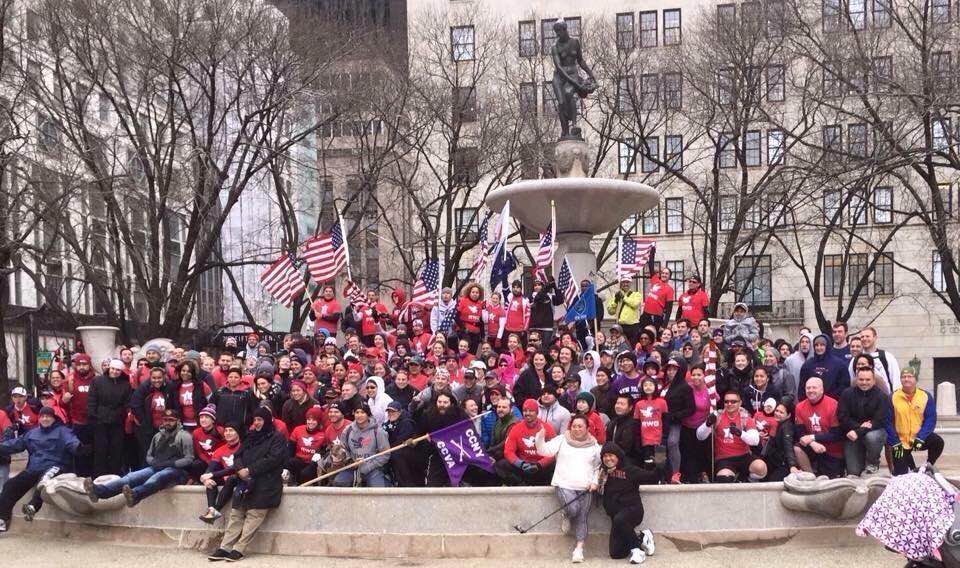
Jonathan Algor felt unarmed in enemy territory. He didn’t know what else to do but retreat.
He signaled to his mother to begin a desperate withdrawal, made his way through the racks of clothing, customers, and shopping carts, and he burst out into the fresh air and finally caught his breath.
Algor had been home in New Jersey for his two week leave from Germany. Stationed overseas in the Army, he had almost no possessions to act as anchors of home. No clothes, no house, nothing to call his own.
His attempted mall outing was supposed be a bonding experience for him and his mother, but it completely failed.
The sensory overload was too much. He wasn’t used to innocuous lights, the noise, the smells: it overwhelmed him; he physically could not stay in the mall long enough to purchase anything.
Algor continued to experience anxiety much like this throughout his transition back home from his six years overseas. His tours in Benji and Baqubah, Iraq resulted in a tough transition back to the civilian life.. He was constantly angry and irritable. Such minuscule things, such as loud noises and bright lights, infuriated him without reason.
His saving grace was his son. A week into his second deployment in Iraq, Algor found out that his wife, Monica, was pregnant with their first son. He was born while Algor was still overseas.
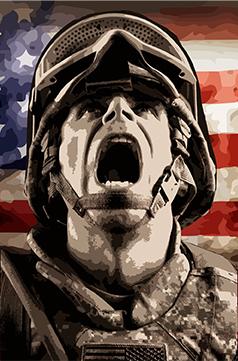
Meeting his lookalike son, Jack, when he was three months old, was “the coolest day ever” according to Algor.
Returning from war and immediately becoming a father to a child one has never met may seem like it should complicate the transition, but to Algor, it made it so much easier. He had something to keep him on track and distracted. He wasn’t even bothered by the loud crying at night because he was a heavy sleeper.
Jack was never a burden. Even in times when Algor was having a hard day and in need of alone time, he could stay up late or find somewhere to be by himself. Jack was a stabilizer.
Today, Algor has three sons. They attend the local elementary schools and play on Shooting Stars, the town soccer club, where he is a coach. Like many Glen Rock parents he commutes to New York City almost everyday. He is a civil litigation attorney.
And although Algor struggled, he was not nearly as bad as others. Having a supportive family helped him in the reintegration process.
He eventually overcame his troubles and became not only a successful lawyer and a father of three, but he is also on the Board of Directors for Team Red, White & Blue where he helps others like himself.
About Team Red, White and Blue
According to the National Institute of Mental Health, post-traumatic stress disorder is a mental disorder that causes feelings of fear and helplessness after one experiences a traumatic event, such as a war, death, or disaster. People with PTSD re-experience memories, show avoidance, have heightened arousal and reactivity, and display cognitive and mood symptoms. They often experience flashbacks, depression, nervousness, and unnecessary guilt.
Overseas, soldiers are accustomed to a structured, platoon lifestyle. They spend months on end with other soldiers, adhering to a distinct schedule to follow everyday. Being part of the military is like being part of a family — sometimes leaving that impromptu family and returning home leads to a jarring transition.
For Algor, who had searched for a way to acclimate himself to civilian life once again, the process is both frustrating and inspiring. He has gone through it himself. He knows the struggles that military men and women face. He takes the insight to Team Red, White and Blue.
To bridge the gap between the military family and the one stateside, the organizers arranged Team Red, White & Blue in a way that kept the “feeling and camaraderie” of the military unit.
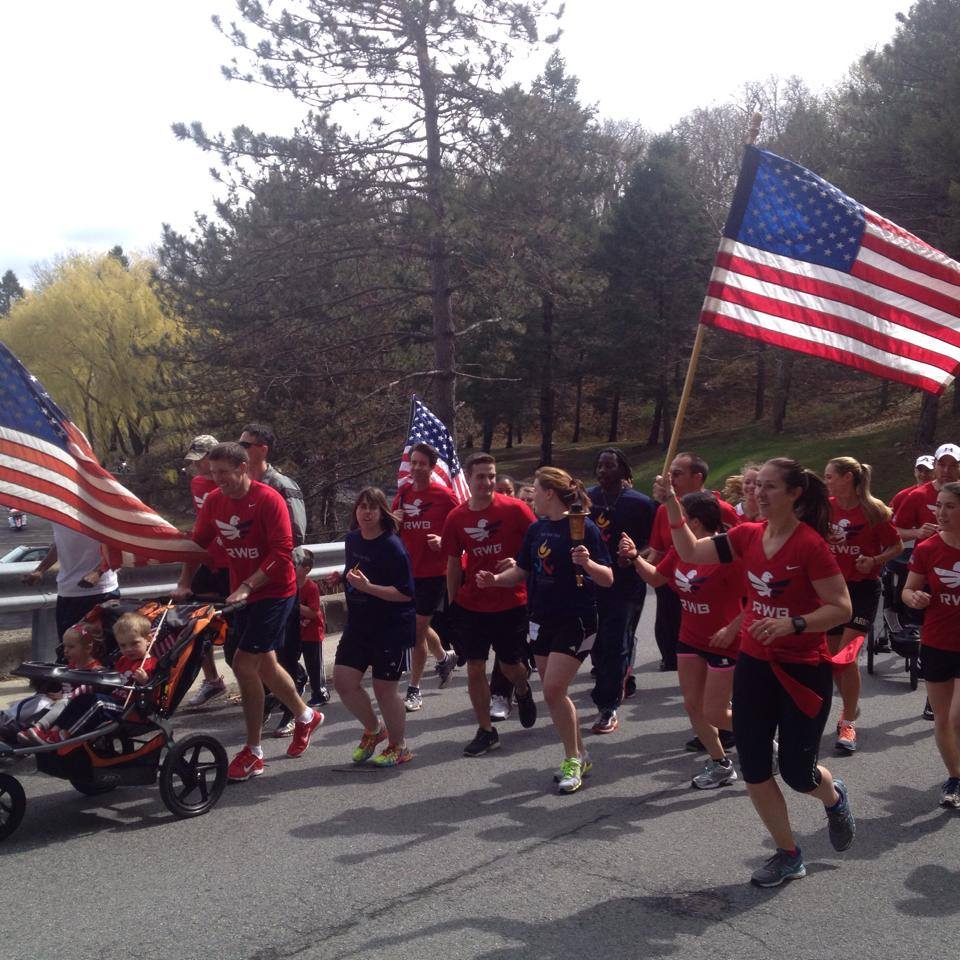
In 2009, after returning to grad school at Michigan University, Algor and his now brother-in-law, Mike Erwin, felt the lost sense of community. Outside West Point, there were almost no other veterans.
At this time, the war Iraq War was starting to slow down and soldiers were returning home with no place to go. The VA could not sustain the amount of veterans who were decommissioned.
Erwin saw this and tried to help by taking part in Wounded Warrior races, but he did not completely agree with the foundation’s ideology. Wounded Warrior focuses on physically disabled veterans, but it doesn’t specifically help with emotional wounds. Erwin wanted to work directly with the veterans he was helping, so, in 2010, he established Team Red, White & Blue.
Team Red, White & Blue is a nonprofit tax-exempt (501c3) organization whose goal is to ease veteran’s transition from military life to civilian life through social and physical activities.
Volunteers around the globe participate in run groups, yoga classes, CrossFit workouts, and large-scale events (such as trail running camps, ultra-marathons, and baseball games). These events aim to bring back the community sense that the veterans lost. The returning soldiers bond with civilian volunteers and other veterans, making them feel like they are part of a community, like when they were overseas.
Team Red, White & Blue started out as a small organization that only raised money through modest donations. For example, people would wear a Team Red, White & Blue shirt and run in a 5K, asking people to sponsor them.
Now, huge events are sponsored by companies like Johnson & Johnson, Microsoft, and Nike. These sponsors donate checks of $50,000 in return for sponsoring an event.
Today, Team Red, White & Blue has over 185 chapters around the world, and still growing, and has assisted over 150,000 veterans.
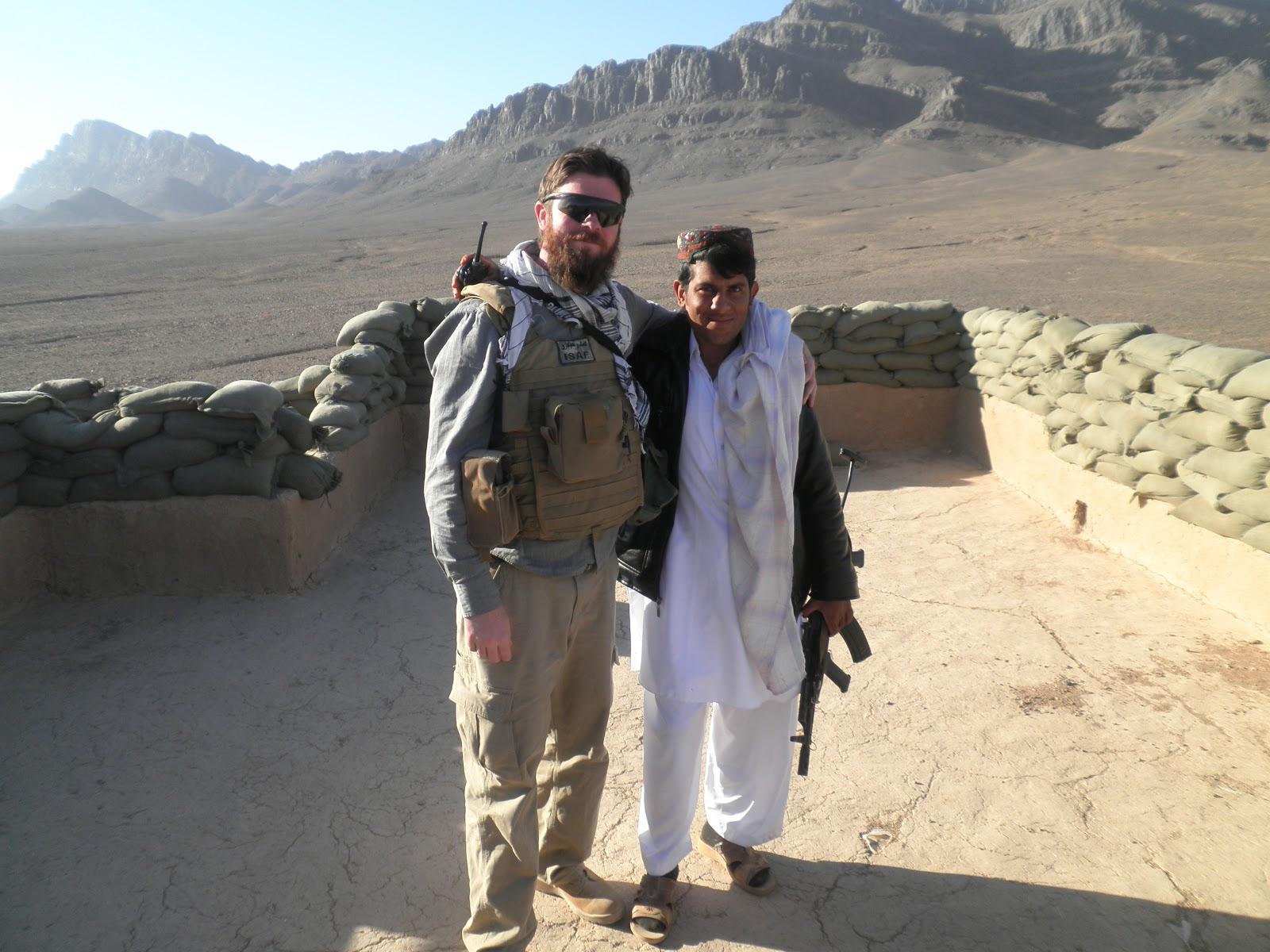
A transition home
Overseas, soldiers have a sense of purpose — to defeat the enemy — and everyone shares that same goal. They deal with the fear and hardships of war with people who are going through the exact same thing. If anyone ever needs help, everyone there could relate.
The idea behind Team Red, White, and Blue was to take that feeling of comradery and bring it back to the United States.
Joe Quinn, today the Director of Leadership Development for Team Red, White & Blue, spent his first tour in the United States Army in Iraq from 2003-2004, his second in Iraq during the surge from 2006-2008, and then served in Afghanistan as a civilian advisor for General David Petraeus from 2010-2011.
His first tour was early on in the Iraq War, so he spent his days dealing with tactics, such as employing security and keeping track of flight directions and platoons. He was living outside in his vehicles, which consequently meant not getting adequate showers or food.
His second tour was during “the surge,” so it was more strategic. The surge was when former President George W. Bush immensely increased the amount of troops sent to Iraq in hopes to provide more security to Baghdad and the Al Anbar Province. He was working for the Reconciliation, a mission that aimed to turn Iraqis fighting for the insurgency into fighting for the government.
During this second stint, Quinn didn’t have to live in vehicles anymore; his living arrangements were more permanent now, as he was living in something soldiers call “hooches.” These areas are almost like mini-towns of identical buildings. They were very simple buildings, each one was rectangular and tan. They contained bedrooms, cafeterias, and channell halls (where Quinn and other soldiers spent their time when they weren’t working).
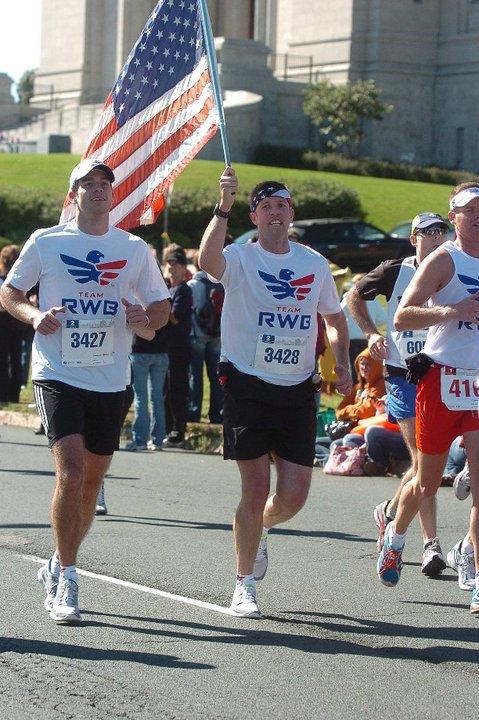
The soldiers became accustomed to the repetitive simplicity of this life, despite its many challenges.
At home, however, life is completely different.
The sense of purpose is gone. There’s not really a tangible goal like there is at war.
They come home and there is so much to do: go to school, get a job, and take care of family.
Yet there isn’t an overarching objective to work toward like there had been overseas.
Back home, veterans often feel left out and have trouble getting help when they need it because few can relate to them.
Formerly strong civilian relationships are often broken because family and friends do not understand why veterans are so depressed and angry. They try their best to be supportive, but they really cannot help. After coming home, veterans can have trouble reconnecting with just about everyone and become very lonely, which adds to the stress of the transition.
Returning veterans also tend to gain weight and become out of shape because they aren’t exercising everyday like they once were.
Everyday, 22 veterans commit suicide because of these factors, all all which lead to PTSD and depression.
When Quinn came home, he spent his first year alone at graduate school at the John F. Kennedy School of Government at Harvard University. He was separated from his family and was by himself for his first year back in the civilian life.
He was having trouble connecting with new people because no one around him was going through what he was, which just made his transition harder than it already was.
He missed his Army buddies.
He gained 25 pounds because he wasn’t exercising as much as he used to and had trouble sleeping.
A common anxiety for veterans is driving. Quinn struggled with this.
The most commonly used weapon in the Iraq and Afghan Wars were IED bombs, or improvised explosive devices. These bombs were placed roadside would explode out of the blue. Hitting potholes brought back memories of the IEDs and made it difficult to drive. When Quinn had to drive, he would stay in the middle of the road, but it still brought him a lot of anxiety.
Team Red, White & Blue tries to fulfill everything that is lost in the transition by connecting veterans with people that can relate and help them.
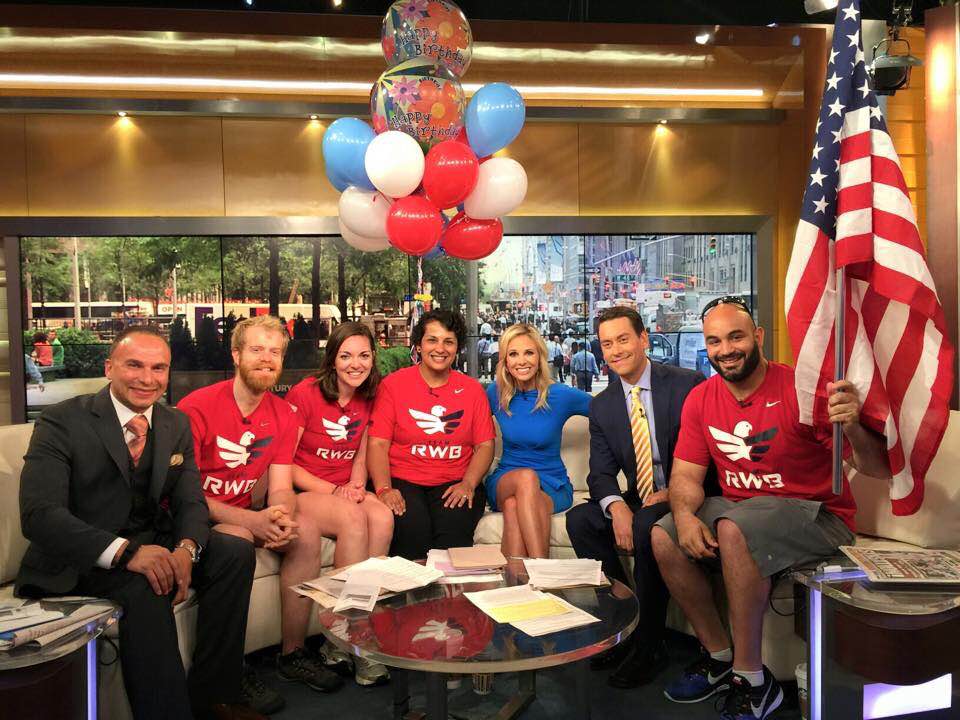
How Team RWB helps
Team Red, White & Blue’s mission is “to enrich the lives of America’s veterans by connecting them to their community through physical and social activity.”
In other words, the organization’s objective is to ease the transition of veterans from military life to civilian life by creating bonds between veterans and volunteers through athletic and communal events.
Each chapter has different small scale events, weekly run groups are very common. These events allow veterans to create new bonds, while also maintaining physical fitness that could be lost otherwise.
Lucy Del Gaudio, Army veteran and Northern New Jersey chapter captain, organizes run groups in Saddle Brook Park and Brookvale Park. Joe Quinn also participates in weekly runs in Central Park.
Team Red, White & Blue also sponsors Crossfit teams. CrossFit is a fitness program founded by Greg Glassman. It is a high intensity workout that tests your strength, speed, and endurance. But, CrossFit isn’t just about fitness, it’s about creating a community and bonding people through physical fitness.
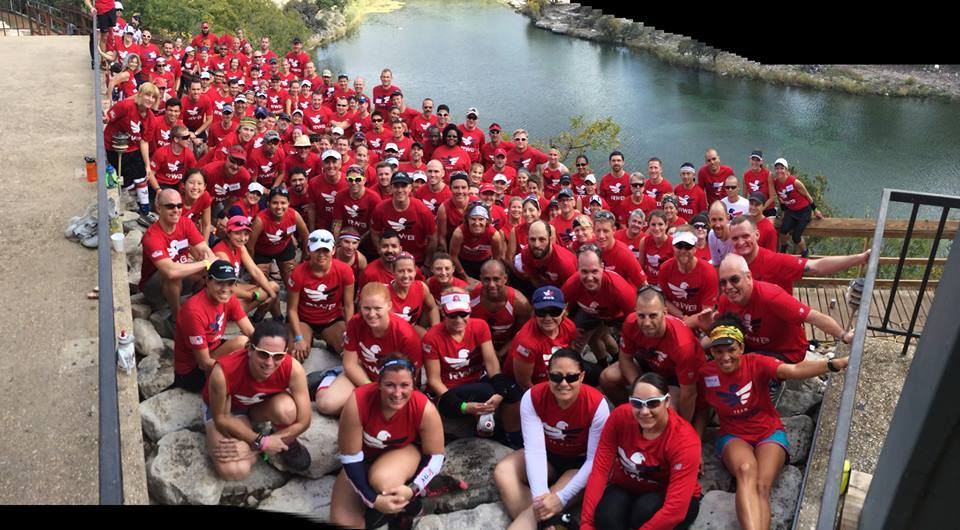
Omar Iglesias, a Navy veteran, works with Team Red, White & Blue, and participates on a CrossFit team. He does hour long workouts that consists of a warm-up, a 20 minute strength section, and 20 minute workout. CrossFit allowed Iglesias to become more physically and emotionally stable and also led him to creating important relationships that eventually helped him create a successful career for himself.
Community service is also a big part of Team Red, White & Blue. Giving back to people in need fills the sense of purpose that is lost, while also creating bonds with people you might not expect.
Del Gaudio and members of her chapter work with Meals on Wheels, a national organization that provides food and safety checks to senior citizens. Every month, they visit a transition home in Garfield, New Jersey for homeless veterans. They provide a themed dinner for them. Not only do they prepare meals, they also spend time with them. They play games and talk to them to support the homeless veterans.
For Del Gaudio this is an incredible experience. Helping people that are just like herself, and meeting veterans from other eras is her favorite part of Team Red, White & Blue. Overseas, she was protecting and helping people, and community service allows her to bring that home too.
In addition, Team Red, White & Blue has a more social aspect. They will take members to sporting events, movies, and bowling alleys so veterans have a chance to create friendships with other veterans and civilians. They also have chapter barbeques where almost 100 members have dinner together.
Team Red, White & Blue also participates in several runs to raise awareness for their organization. In addition to wearing their trademark “We are the Eagle” apparel, they stand out by running with an American flag. In every race the organization takes part in the carry the flag so everyone knows it is them. They have competed in the VEThack Ruck March To End Veteran Suicide, the JFK 50 Mile, Minnesota Twin Cities Marathon, Detroit Marathon, the Run as One, the Special Olympics Marathons, and hundreds of other. Participating in these runs not only raises awareness and increases donations, but also allows members to bond by training together.
Team Red, White & Blue also hosts large scale events that are sponsored by huge corporations such as Nike and Johnson & Johnson.
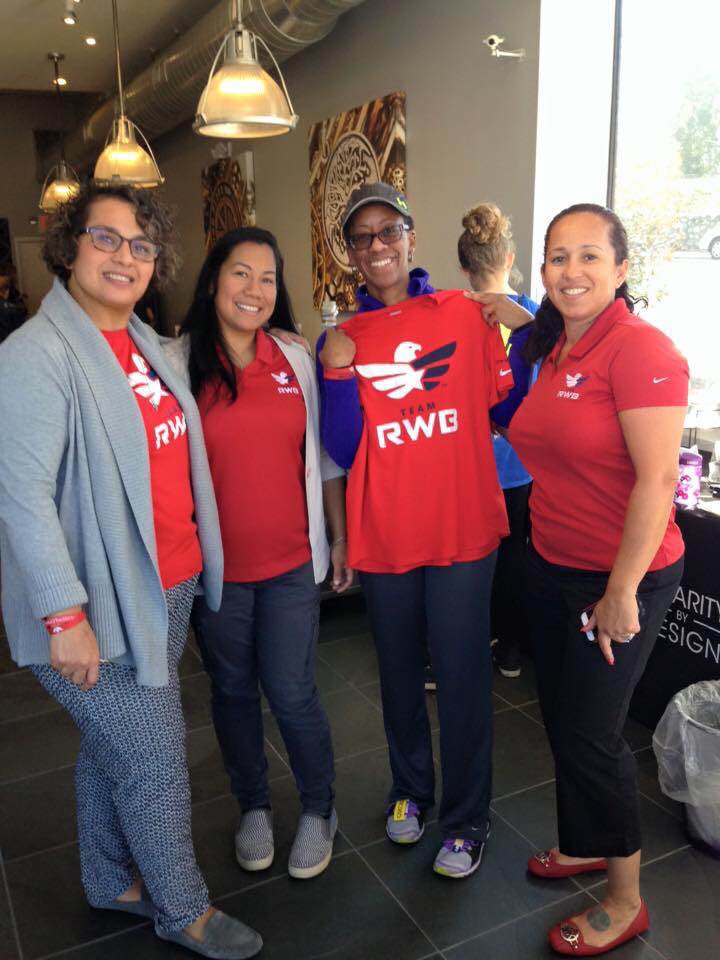
The Old Glory Relay is a Team Red, White & Blue run event that is sponsored by Microsoft, the Bob Woodruff Foundation, and many others. A single flag is carried across the country by hundreds of people over a span of about 60 days. The past two years, the run started on September 11 in California, across the country, until Veterans’ Day when they finished in Washington D.C. This year however, it will begin in Seattle, down the west coast, and then across country, finishing in the Team Red, White & Blue national headquarters in Tampa, FL. The last Old Glory Relay ran over 3,500 miles. Athletes endured temperatures up to 110 degrees and below freezing. They relay raised $436,000 and increased memberships by 19 percent. This event allows over a thousand of members from chapters all over the country to join together and create new relationships and spread awareness for veteran issues and Team Red, White & Blue.
Trail Running Camps are also a huge event. Based out of Texas, each chapter sends a few members to take part in the program. Professional athletes come to mentor. It’s not all running though, mentors teach about trail running techniques, training plans, gear, nutrition, injury prevention and first aid, and trail etiquette.
Team Red, White & Blue also helps with non-military problems.
Joe Quinn lost his brother, James Quinn, on September 11, to the terrorist attacks on the World Trade Center. He worked at Cantor Fitzgerald, a financial service firm that was located on the 102 to 104 floors of the North Tower. James was one of the 650 Cantor employees that lost their life that day.
Joe Quinn was a senior at the United States Military Academy at West Point when he found out. He had a lot of trouble dealing with the news. For the first 12 years, he kept it to himself most of the time, keeping his emotions bottled up inside of him. Team Red, White & Blue helped him reconcile with it and become more open. It taught him that one can use tragic moments to become a leader and help others.
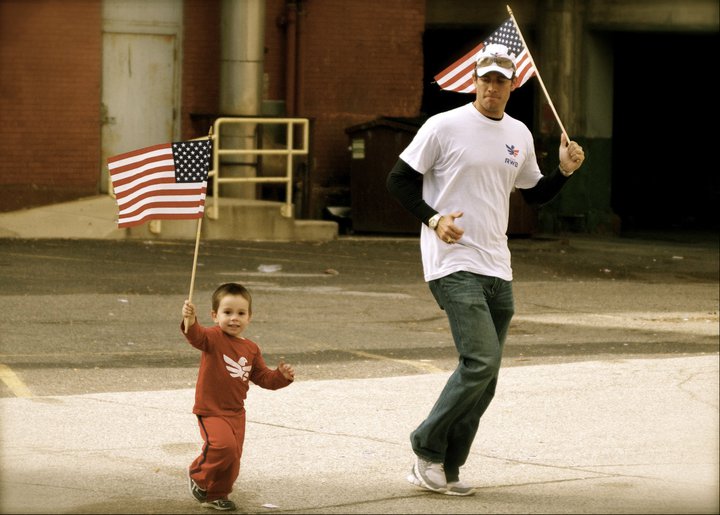
Steve Williams • May 19, 2016 at 9:27 pm
I really enjoyed the article. It was very well written and educational. And for me, illustrated the real and difficult impacts that traumatic experiences/events (in this case military) can have on a person. Great job educating the reader about anxiety and PTSD and highlighting groups like Red, White and Blue that are working hard to help veterans with PTSD and assisting them to transition back into civilian life. Thanks!!
Lucy Del Gaudio • May 19, 2016 at 5:20 pm
Thank you!!! Excellent article and glad to have been a part of it!!!
Erin Quill • May 19, 2016 at 4:20 pm
Really great piece. So well written.
Julia Rooney • May 19, 2016 at 1:11 pm
Great job Kate! So interesting!
Nick Zakowski • May 19, 2016 at 12:43 pm
Ok
Juan San Juan • May 19, 2016 at 12:42 pm
Very good work! You shall be a pro writer in your destiny. Gracias. Muy bien